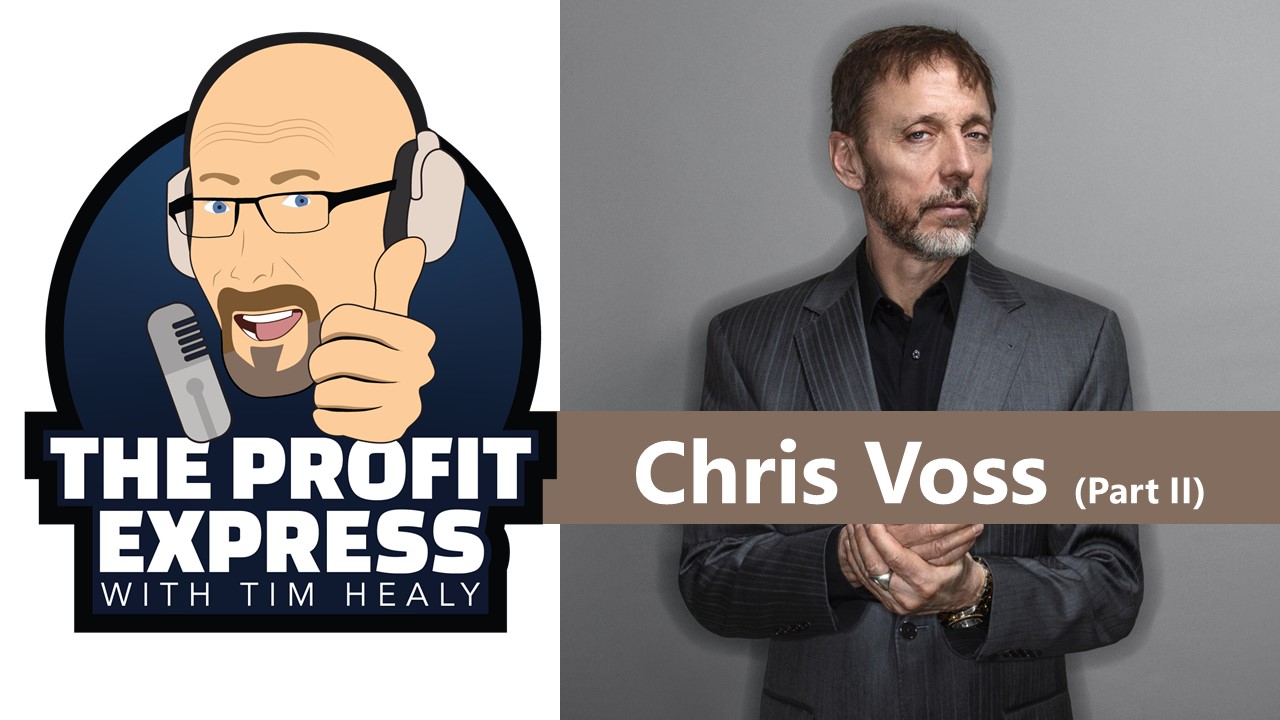Win Your Next Negotiation with Chris Voss Part II

by Tim Healy
Podcast: Play in new window | Download
Subscribe: Apple Podcasts | Google Podcasts | Spotify | Amazon Music | Deezer | RSS
Win Your Next Negotiation with Chris Voss
It is time to Win Your Next Negotiation because your success may depend on it. Each day, you negotiate with people both in and out of the office. Even if you don’t think you are a negotiator, developing your skills is vital for success in life.
In today’s interview, I speak with former FBI Hostage Negotiator Chris Voss. Chris is the author of the book Never Split the Difference. He is also the founder and principal of The Black Swan Group, which provides training to Fortune 500 companies on complex negotiation techniques.
In part 2 of my interview with Chris Voss, we cover the importance of the right negotiation tactics. Whether you are a manager or a stay-at-home mom, these lessons can help you take on any negotiation. If you missed part 1 of my interview, you can check it out here.
The Importance of Emotion
Throughout his years as lead FBI Hostage Negotiator, Chris worked on countless kidnapping cases. One of his biggest cases emphasized the importance of emotions and tactical empathy in negotiations.
Listen at :18 where Chris explains a major lesson he learned in tactical empathy. During a 6-hour hostage negotiation, Chris continuously described the future for the kidnappers, assuaging their fears and ensuring they would be brought out with dignity. Through this tactic, Chris was able to convince the kidnappers to end the standoff. The kidnappers were worn down, but told him that they felt better after 6 hours of hearing “we’re not leaving.” Chris emphasizes that the right voice and thoughts can make anyone feel like they can collaborate with you.
Your biggest problem is your biggest problem
Chris spent many years as a negotiator where lives were on the line. Even if your daily negotiations are not a matter of life or death, the same techniques apply.
At 6:10, Chris Voss explains how your biggest problem is always your biggest problem. Whether you are on Wall Street or Main Street, the system of decision-making in our brain always functions the same.
The Negotiation Starts with “No”
Listen at 7:30 to learn more about our addiction to the word “yes.” Whether you are negotiating a raise or just getting your kids to do chores, you’re looking for a “yes.” Chris discusses how Robert Cialdini wrote that “yes” is one of the most beautiful words in any language. The sound of “yes” makes us happy.
On the other side of the negotiation, no one wants to be persuaded to say “yes.” When we’re asked for the “yes,” we typically become less trusting.
How do we break this addiction to become a better negotiator? Chris’s approach is to forget about the “yes” and go for a “no.” Instead of asking “Do you agree?” try asking, “Do you disagree?” Most people are afraid of getting a “no.” By letting people feel safe when they give a “no” response, you create an opportunity for a dialogue.
Intelligence doesn’t always equal strong negotiation skills
Which types of people make the best negotiators? Listen in at 11:20 to discover how highly-educated individuals are often too busy trying to show their intelligence. This causes a failure to listen, leading to failed negotiations.
A Deal Isn’t Always a Deal
At 12:05, Chris goes into detail which hostage negotiation had the biggest impact on him. During one mission, an agreement was in place, but never implemented. Tragically, hostages were killed in the resulting botched rescue mission.
Chris explains that data from one telecommunications company shows that half the deals they sign are never put into action. It is important to have the proper strategy in place to prevent this if you want to win your next negotiation.
Information is Power when You Negotiate
Many people believe that to be a strong negotiator, they must control the conversation. As Chris explains at 14:40, the most important part of a negotiation is being able to listen.
Try it for yourself. The next time you’re in a cab or ordering a coffee, see if you can get the other person talking. Try to summarize his or her point of view before you give your own. You’ll be shocked at how much information you can get when someone thinks you’re listening. The key is to get someone to say, “that’s right,” and not “you’re right.”
Learn More from Chris Voss
If you want to win your next negotiation YOU can sign up for his free newsletter by texting FBIEMPATHY to 22828.
If you liked my interview with Chris Voss – you can download more great episodes of The Profit Express – right here!
Recommended Posts

Is Your Ego Destroying Your Startup?
02 Jul 2025 - Podcasts

Do You Need a Sales Coach?
08 Jan 2025 - Podcasts

Are You a Bookable Speaker?
16 Oct 2024 - Podcasts
